Existing User Log In
New User Registration
Register for a free account to gain full access to the VGChartz Network and join our thriving community.



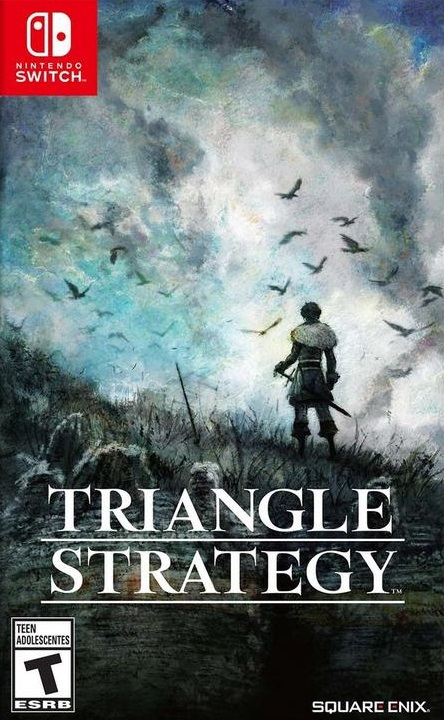

America - Front
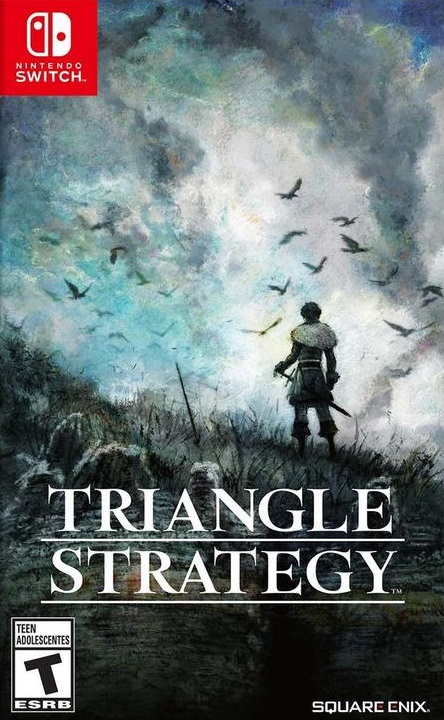

America - Back

It hasn't really been the best couple of months for Square Enix, has it? First there was that whole letter from Yosuke Matsuda deriding people who play games to have fun and noting that the company would be investing heavily into NFTs. Then the Kingdom Hearts collection on Switch wound up being cloud-based, resulting in it having the stability of a uranium isotope. And then Chocobo GP and Babylon's Fall - full price releases jam packed full of microtransactions - were received about as joyfully as the Spanish Flu. Something desperately needs to go right for Square Enix, and with Tetsuya Nomura presumably busy delaying the next bit of Final Fantasy VII for another ten years and Yoko Taro desperately trying to sell unbought copies of Nier Replicant out of the back of a van, the only ones available were the Octopath Traveler people.
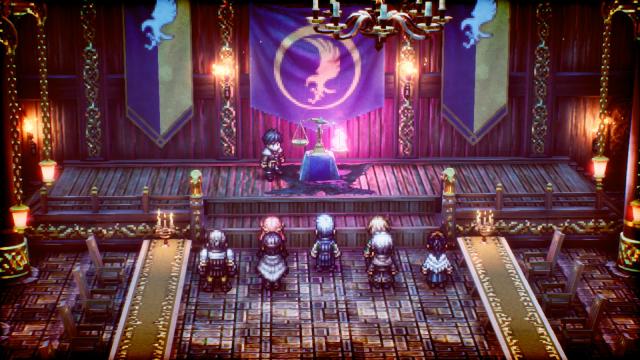
Speaking of Octopath, let me start off by saying that this game is an absolute visual treat. The title’s Octopath-esque sprites and art direction are gorgeous; it’s a visual style I don’t think I’ll ever grow tired of looking at. Not every game would benefit from it, but for those that don’t need a particularly realistic-looking art style it’s hard to think of many things that would be a better artistic choice than these little sprites. My only complaint is that we don’t get to see much of the beautiful full body artwork of the characters.
Voice acting is another area of strength - something I’ll admit I wasn’t really expecting after Octopath Traveler, which wasn't so great in that respect. The English voice actors all do a superb job with their lines, and I fully suspect several of them will wind up on my 'Best Performance' nominees list at the end of the year. Shai Matheson, Adam Harrington, and Emma Ballantine all put on great performances, and the always-incredible Samantha Dakin, fresh from doing an exceptional job with Adelle in last year’s Bravely Default 2, puts on a superb encore performance here as well. The cast does such a good job that, at various story points when characters would die, I found myself actively thinking "dang, I’m not going to hear their voice again."
Triangle Strategy focuses on the tale of Serenoa, a new lord having just replaced his duke father in the kingdom of Glenbrook. Glenbrook is one of three nation-states within the larger continent of Norzelia, and at the start of the game it's trying to strengthen a somewhat uneasy alliance between itself, the dutchery of Aesfrost, and the Holy Roman Empire State of Hyzante. Serenoa gets roped into an arranged marriage to try and strengthen ties between Glenbrook and Aesfrost, except things aren’t quite what they seem. Sure enough, this all winds up being part of a larger scheme for Aesfrost to attack Glenbrook, forcing Serenoa, his bride to be, and his retainers to flee for their lives and go on the run attempting to make sense of the now topsy turvy world around them.
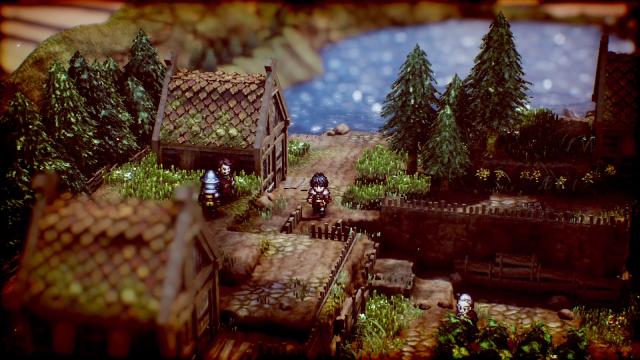
If it wasn’t clear already, Triangle Strategy loves its worldbuilding about as much as it hates coming up with appealing names. It’s obvious that a good deal of time and effort was put into making Norzelia feel like a realistic place, with lots of side characters to offer unique perspectives on the world, history lessons about the backstory of the world, and a myriad of long dialogue sessions to fully flesh out the three nations and their various subfactions. The narrative itself is also at the front and center, with a story that remains engaging throughout and carries plenty of interesting twists and turns.
While I appreciate any game that puts in the effort to try and flesh out its characters and world, it is possible to have too much of a good thing. Triangle Strategy is so desperate to tell you about this cool world it made and the people inhabiting it that it sometimes forgets it's supposed to be a piece of interactive entertainment. Dialogue segments between battles can frequently drag on for upwards of 15 minutes with very little player input, and that’s only with the required scenes being viewed. If you take the time to view all the optional scenes that flesh out the world even more, you can be sitting there for close to half an hour between gameplay segments sometimes. The result is a title that feels very inconsistently paced. I attribute a lot of that to the dialogue itself; while well written, there's just way too much of it, often using 20 words when 5 would have sufficed. It’s not quite as bad as the typical Hideo Kojima affair, but it's certainly well within striking distance.
When you do finally manage to drag the game kicking and screaming away from its narrative, there are some interesting mechanics found within. My initial impression that Fire Emblem would be the best comparison was met with a swift dismissal; this is a love letter to Final Fantasy Tactics through and through. Unlike most SRPGs, player and enemy phases are not separate things. Keeping track of who is scheduled to move when is important, as is choosing which enemy units to eliminate. Remaining health, positioning, turn order, and more all come into play.
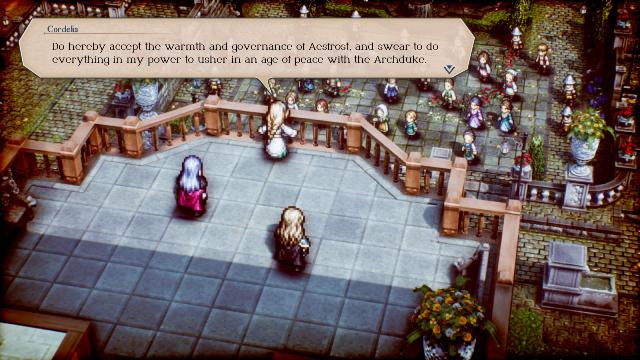
One thing that does undermine the difficulty a bit is the lack of a permadeath feature. Titles like X-Com, Tactics Ogre, and Fire Emblem include permadeath because, broadly speaking, the chances of the enemies on any one particular map managing to kill off your entire squad is relatively slim. Instead, it’s a war of attrition; you might make it through the map, but you could lose a good unit that you’ve sunk a lot of resources into in the process. Losing a valuable character can be very punishing, so this creates a dilemma; whether you think you can progress without that character, or whether it’s worth it to redo the level and avoid that mistake.
Triangle Strategy has no such feature, however, and as a result you can basically just breeze through the game with virtually no threat to your chances of winning. As long as you don’t completely fall asleep at the wheel, there are few maps difficult enough to genuinely threaten all of your units, and while there are some maps that will fail you if a certain character falls, it’s easy enough to just position them at the back and ensure they never get touched. This, somewhat ironically, means that there’s very little actual strategic decision making required to beat the game, which rather undermines the "strategy" portion of "Triangle Strategy". Then again, I’ll admit I didn’t see many triangles throughout the journey either, but I guess “Pixel Art People Talking and Fighting for 30 Hours” probably would’ve been turned down by marketing.
This also casts something of a shadow on the game's combat mechanics, which by themselves are pretty interesting. For example, there’s a very heavy emphasis on terrain, and its effect on unit movements and additional damage. One way to exploit this is to cast lightning magic on enemy units standing in watery terrain to deal extra damage. If there's no water on the map, however, you can create some by casting an AoE ice spell, and melting that into water with an AoE fire spell. Similar mechanics like this create for some very deep combat, it’s just a shame that there’s little reason to ever actually use it because brute forcing your way through everything is much simpler and requires less precision.
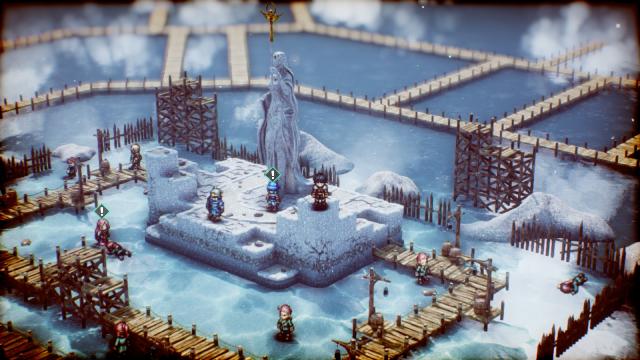
Admittedly, you could try to play a self-imposed iron man for the most part, but even that falls through at points due to the aforementioned requirement to deploy certain characters in later levels. On repeat playthroughs, you could just force yourself to quit if you lose a character that you know you’ll need later, but on a first playthrough this isn’t feasible without becoming the first human to develop clairvoyance, so even trying to make the game harder has its limitations. And, as a side note, I also don’t want to do an iron man because Triangle Strategy does emulate popular tactics games in some of the worst ways possible with same turn reinforcements and a map that suddenly blocks you from using various characters which are integral to your team, gameplay experiences that are still as enjoyable as pouring hot coffee on your groin.
I don’t want this complaint to come off as “this game doesn’t have the thing that other games do, and that is inherently bad.” A permadeath feature certainly isn’t a necessity. But I do think that if a strategy game wants to go in a different direction, then it at least needs to include something to make up for what the permadeath feature does, which is create an incentive to play carefully. Titles such as Fire Emblem and X-Com make you play carefully by threatening a heavy penalty for careless decision making. There are ways to do this besides permadeath that Triangle Strategy could have pursued; other strategy games have employed maps that require the player to complete them with a certain number of turns, or force the player to hold out and defend a certain area of the map from constantly spawning enemies for a certain amount of time. Unfortunately, almost all of Triangle Strategy’s maps just boil down to some variation of “rout the enemy,” and with no other way to really "punish" the player for poor decision making, it’s hard to feel like you ever really need to be... well, strategic.
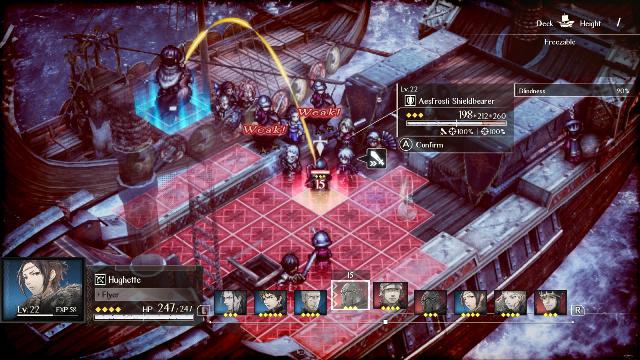
That said, a game need not necessarily provide a challenge to be good. Gameplay can predominantly be a means to engage the player within a narrative, or to connect them better to a cast of characters. And I think that’s where Triangle Strategy is at its best, because the story is pretty freaking fantastic for the most part. Yes, it’s more than a tad wordy, but the characters are genuinely likable, with their own distinct personalities that set them apart from each other, and the story remains engaging through to the end. I think I’d personally recommend Triangle Strategy foremost as an outlet for people who want to immerse themselves in a complex, character-driven narrative more so than players looking for a meaty strategic challenge.
I also think this focus of priorities is encapsulated well by the other big gameplay component: the persuasion sections. Every few chapters, you’ll come across a dilemma where you can make one of two or three choices. These range from the relatively insignificant, like slightly altering the map for the next battle segment, to ones that drastically change the course of the story. The rub is that you don’t really make these decisions yourself. Instead, a series of supporting characters gets to vote on which path to follow, and you can try to influence them to vote differently by talking to them.
It’s much more of a story element than a gameplay element, as the "strategy" for this always winds up simply being to make up your own mind and then attempt to convince all the people who disagree with your position to change their vote. Using this logic, I never had a decision go against my personal wishes all game, which really just makes this a decision-making mechanic with extra steps. But, again, I suspect the persuasion element is there less for gameplay purposes and more to try and engrain the feel of being part of a larger faction, dealing with competing views and opinions about how to proceed.
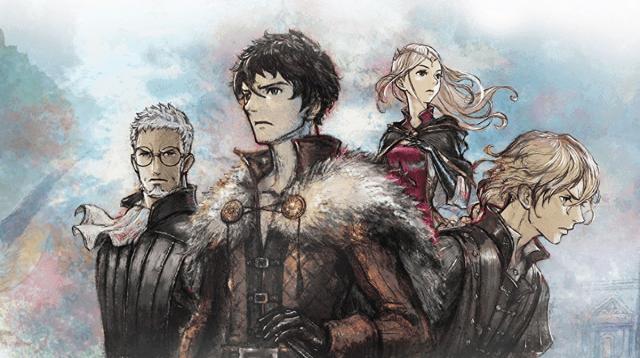
If you look at it that way, I think Triangle Strategy’s general design makes much more sense, especially since the amount of content on display due to the branching paths is frankly absurd. I think I played just over a third of the available maps on my first go around, looking at a list of them all in a walkthrough. There are so many alternate chapters and battles that, quite frankly, there was no way the maps or the overall gameplay was likely to be especially well designed.
Triangle Strategy is at its best when you meet it on those terms - as a choose your own adventure with just enough interactivity to keep the player involved and a well-written (if sometimes wordy) story. If you come at it looking for a strategy game first and foremost, I suspect you’ll be disappointed. However, if you’re willing to view it more as an experience rather than a real test of your decision making chops, you’ll likely find yourself very engrossed.









